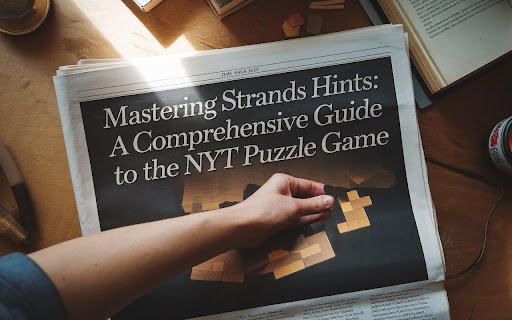Introduction
Among word game aficionados, the New York Times’s Strands Hints is fast gaining popularity. Strands combines features of word search with those of crossword puzzles to provide an interesting and fun daily challenge. Strands Hints are explored in great detail in this guide, together with vital ideas, approaches, and answers to make your puzzling experience better.
What Is Strands?
Seen on the New York Times website and app, Strands Hints is a daily word puzzle game. Players are given a theme and a 6×8 letter grid each day. By linking neighboring letters horizontally, vertically, or diagonally, the goal is to reveal every theme-related word. One of these words, called the “spangram,” traverses the grid from one side to the other and captures the day’s theme. You can read more content by click here WhatsApp Blue.
Understanding the Pangram
At the heart of the Strands puzzle is the spangram. It is one word that links all the theme words and runs across the grid either horizontally or vertically. Early identification of the spangram can give Strands Hints that help to find the other theme words much more simply.
On the hunt,” for example, the reasonablegram might” include things like “eggs” and “candy.”
Tips and Strategies for Solving Strands
To enhance your Strands-solving skills, consider the following strategies:
1. Start with the Spangram
Since the spangram spans the grid and encapsulates the theme, identifying it first can provide a solid foundation. Once found, it often becomes easier to spot related theme words.
2. Look for Common Prefixes and Suffixes
Many words share common prefixes like “un-” or “re-” and suffixes like “-ing” or “-ed.” Recognizing these can help you form additional words from the letters available.
3. Use Non-Theme Words for Hints
If you’re stuck, finding non-theme words (at least four letters long) can earn you Strands Hints. Every three non-theme words submitted unlock a hint, revealing a letter from one of the theme words.
4. Focus on Longer Words
Longer words often score higher and can help clear out more letters from the grid, making it easier to find shorter words.
5. Practice Regularly
Like any skill, regular practice improves performance. Consistent play helps familiarize you with common word patterns and themes.
Example Puzzle Breakdown
Analyzing a specific puzzle helps to show these approaches:
- Theme: “On the hunt”
- Spangram: “EASTERBASKET”
- Theme Words: “EGGS,” “BUNNY,” “CANDY,” “TOYS,” “PEEPS,” “BOOK”
Starting with the spangram “EASTERBASKET,” players may easily recognize connected terms like “EGGS” and “BUNNY.” By submitting non-theme words, including “TOYS” and “BOOK,” one can unlock Strands Hints, showing letters for other theme words. This method simplifies the solving of the puzzle.
Advanced Strategies for Seasoned Players
One should regard these sophisticated techniques as further means to improve their performance once they have perfected the fundamentals.
1. Analyze Letter Frequency
Some letters recur more often in English. Concentrating on these frequent letters will help you to rapidly create many words and therefore boost your odds of finding theme words.
2. Utilize Word Families
Organize words according to their roots. For instance, if you spot “RUN,” think about variations like “RUNNER,” “RUNNING,” or “RUNS.” This method will enable you to find several words from a given root.
3. Experiment with Anagrams
Sometimes changing the letters in the matrix can expose concealed words. Trying out several combinations can reveal less apparent theme words.
4. Collaborate with Others
Discussing one’s Strands Hints passion with other fans offers fresh perceptions and ideas. Sharing answers and ideas helps you to better appreciate and grasp the game.
Final Thoughts
Combining components of word search and crossword, Strands Hints provides a new approach to conventional word search playoffs. Knowing the mechanics, using techniques such as early spangram identification, and regular practice will help you to increase your puzzle-solving ability and make the most of the game. Every riddle offers you a chance to test yourself and grow your lexicon. Joyful problems!




